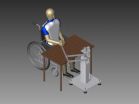Language learning makes the brain grow
2012-10-09
(Press-News.org) At the Swedish Armed Forces Interpreter Academy in the city of Uppsala, young people with a flair for languages go from having no knowledge of a language such as Arabic, Russian or Dari to speaking it fluently in the space of 13 months. From morning to evening, weekdays and weekends, the recruits study at a pace unlike on any other language course.
As a control group, the researchers used medicine and cognitive science students at Umeå University – students who also study hard, but not languages. Both groups were given MRI scans before and after a three-month period of intensive study. While the brain structure of the control group remained unchanged, specific parts of the brain of the language students grew. The parts that developed in size were the hippocampus, a deep-lying brain structure that is involved in learning new material and spatial navigation, and three areas in the cerebral cortex.
"We were surprised that different parts of the brain developed to different degrees depending on how well the students performed and how much effort they had had to put in to keep up with the course", says Johan Mårtensson, a researcher in psychology at Lund University, Sweden.
Students with greater growth in the hippocampus and areas of the cerebral cortex related to language learning (superior temporal gyrus) had better language skills than the other students. In students who had to put more effort into their learning, greater growth was seen in an area of the motor region of the cerebral cortex (middle frontal gyrus). The areas of the brain in which the changes take place are thus linked to how easy one finds it to learn a language and development varies according to performance.
Previous research from other groups has indicated that Alzheimer's disease has a later onset in bilingual or multilingual groups.
"Even if we cannot compare three months of intensive language study with a lifetime of being bilingual, there is a lot to suggest that learning languages is a good way to keep the brain in shape", says Johan Mårtensson.
###
The study was performed by a group of researchers at Lund University and the Umeå Centre for Functional Brain Imaging in collaboration with the Swedish Armed Forces Interpreter Academy. The findings have been published in the scientific journal NeuroImage. http://www.sciencedirect.com/science/article/pii/S1053811912006581
For more information, please contact Johan Mårtensson, johan.martensson@psychology.lu.se, +46 707 554401.
ELSE PRESS RELEASES FROM THIS DATE:
2012-10-09
Forget the TV remote and the games controller, now you can control anything from your mobile phone to the television with just a wave of your hand.
Researchers at Newcastle University and Microsoft Research Cambridge (MSR) have developed a sensor the size of a wrist-watch which tracks the 3-D movement of the hand and allows the user to remotely control any device.
Mapping finger movement and orientation, it gives the user remote control anytime, anywhere – even allowing you to answer your phone while it's still in your pocket and you're walking down the street.
Being ...
2012-10-09
This press release is available in German. Catalytic converters work poorly if they have not yet warmed up. Tiny metal particles in a catalytic converter require a minimum temperature to function efficiently. At the Vienna University of Technology, thanks to a new measuring method, it has now become possible to examine many different types of these particles at the same time. Reliable information regarding what it is exactly that the efficiency of catalytic converters depends on has thus been obtained for the first time.
Low ignition temperature desired
"A large part ...
2012-10-09
A tabletop system where users can come together and view shared content will be unveiled today [Tuesday 9 October]. A team of scientists, led by the University of Bristol, have developed the system aimed at supporting mixed-focus collaborative tasks.
Researchers from the University's Department of Computer Science will present PiVOT (personalised view-overlays for tabletops) at the 25th ACM UIST 2012, a symposium for innovations in the software and technology of human-computer interfaces.
Through two view zones, PiVOT provides personalised views to individual users ...
2012-10-09
Scientists from the Spanish National Cancer Research Centre (CNIO) in Madrid, along with British colleagues from the Institute for Cancer Research (ICR) and the Royal Marsden NHS Foundation Trust, have developed a test that studies genetic patterns in blood cells to detect advanced–stage prostate cancer. The results of the study are being published today in the journal The Lancet Oncology.
The study shows that gene patterns in blood cells act as a barcode and could be used together with the current PSA test to select those patients with the worst prognosis in need of ...
2012-10-09
Oxford, October 8, 2012 - A nanotech material containing an extract from liquorice can be used to sterilize and protect medical devices and implants which include biological components, and protects these functional bio-components during the sterilization process.
Publishing their findings in the latest issue of Materials Today, a team of researchers from Germany and Austria explain how conventional sterilization techniques based on a blast of radiation, or exposure to toxic gas can damage the functional biological components of the device. The coating, containing a component ...
2012-10-09
This press release is available in German.Ferrara/Leipzig. New methods might allow polluted sites to be investigated and monitored long term at significantly reduced costs. Authorities and those who have to remediate polluted sites in Europe might therefore be able to save costs and use these to treat other areas. This is the conclusion of the EU research project ModelPROBE, which was coordinated by the UFZ. The results, with which the scientists aimed to lower the workload of authorities and consultants, include a handbook detailing the methods for characterising contaminated ...
2012-10-09
VIDEO:
This is about the worldwide patent for a Spanish stroke rehabilitation robot.
Click here for more information.
Robotherapist 3D, a robot which aids stroke patients' recovery, is to be brought to market by its worldwide patent holder, a spin-off company from the Miguel Hernández University of Elche (Alicante, Spain). It is the first robot to enable patients to start doing exercises while supine, allowing them to begin shortly after the stroke and expediting recovery. ...
2012-10-09
Almost 100 freshwater species not native to the UK have invaded the River Thames catchment making it one of the most highly invaded freshwater systems in the world, according to scientists at Queen Mary, University of London.
The research, published in the journal Biological Invasions at the weekend, suggests that legislation to prevent the introduction of non-native species across the UK has been unsuccessful. The cost to the British economy of invasive non-native species is £1.7bn every year (CABI report, 2010).
Lead author, Dr Michelle Jackson* who undertook the ...
2012-10-09
The scientific analysis in this document shows that the research design of Séralini et al. contained fundamental shortcomings that preclude any sensible conclusions from being drawn. In other words, the statements that Séralini made about the health effects of GMOs and Roundup were baseless. Moreover, the research shows signs of selective interpretation of the findings or a misleading representation of these, which is contrary to prevailing scientific ethical standards.
###View the entire analysis online: http://www.vib.be/en/news/Pages/VIB-concludes-that-Seralini-study-is-not-substantiated-.aspx
...
2012-10-09
This press release is available in Spanish. The goal of the scientists in the Information and Communications Technology Security Group (Seguridad de las Tecnologías de la Información y las Comunicaciones - SeTI) at UC3M who are working on the E-SAVE project is to use information technologies (ITs) to improve the enforcement of certain traffic regulations. Specifically, they propose a set of systems for the automated, immediate and telematic supervision and management of the administrative sanctioning process. The purpose is to reduce highway accidents, given that one of ...
LAST 30 PRESS RELEASES:
[Press-News.org] Language learning makes the brain grow

